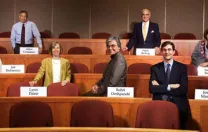Teaching matters at Harvard Business School (HBS)—faculty members spend as much time preparing for each class as they do conducting the actual discussion sections. Those traits are especially apparent in a course like “Leadership and Corporate Accountability” (LCA), which melds diverse disciplines, and where the reciprocal effects on faculty members’ research and on their teaching in their specialized fields are also pronounced.
First-year HBS courses are divided into sections of about 90 students, who take all of their classes together. The nine LCA faculty members met before the 80-minute classes to review their “teaching plan” for each case, from framing the major questions to detailing how they would use the Aldrich Hall blackboards and audiovisual facilities to direct discussion.
|
During one meeting, the faculty group wrestled with a complex case involving Xerox Corporation’s fall into financial crisis in 2000. One option facing the company and its new chief operating officer, Anne Mulcahy, was bankruptcy: staving off creditors, but wiping out the careers, benefits, and retirement savings of tens of thousands of employees. Because LCA students would already have encountered aspects of bankruptcy in earlier cases (as Aaron Feuerstein fought to rebuild Malden Mills after a fire, and as Marriott Corporation engineered a recapitalization), William W. George posed the question of how to lead the class through the use of bankruptcy and its effects on stockholders, lenders, employees, and customers—all constituents pertinent to the course. The teaching challenge was to focus in a realistic way on the dilemma facing management, without bogging students down in financial or legal minutiae.
Thomas R. Piper, whose scholarly expertise is in financial reporting and controls, had reconstructed the financial statements, aiming to provide the data necessary to understand Xerox’s condition. Mulcahy—new to her position, with a sales and marketing background—confronted poor results and pressure to make gut-wrenching decisions in face of investigations into the accuracy of Xerox’s financial reports. Would Piper’s data make the case more vivid, or muddy the discussion?
George suggested the essence of the case was what Mulcahy should do in the face of excruciating uncertainty. Sandra J. Sucher suggested focusing on the alternative choices students would make when information could be relied on, and when it could not. In the end, after thorough vetting of several different teaching strategies, the classes focused principally on management’s decisions, as Mulcahy opted for a long-term recovery, not bankruptcy, but at a cost of 20,000 jobs.
 |
| Rohit Deshpandé |
In such discussions, professors Lynn S. Paine and Joseph L. Badaracco Jr. brought to the table their research in organizational and individual ethics and values. Paine and Henry B. Reiling, a member of the school’s finance unit, contributed perspective from legal practice. Kresge professor of marketing Rohit Deshpandé injected a customer outlook, frequently reminding colleagues of constituents outside the boardroom (people considering a long-term contract with Xerox, for example), and drew on his research in developing markets. Allen S. Grossman, William George, and Sandra Sucher brought management experience to the mix. Many of the comments aimed at helping prepare Joshua D. Margolis, Murphy associate professor of business administration, to teach LCA for the first time. The goal was to blend this expertise into a stimulating class for students from multiple nations and even more diverse professional backgrounds, whose comments and questions might spark vigorous debate in a dozen directions.
 |
| Joshua Margolis |
Deshpandé called the result “the most wonderful assignment that I’ve ever had” in more than a quarter-century of teaching. The students were “fascinated and fearful” as they encountered the course. In turn, he said, his exposure to the material had led him to consider marketing cases—on selling shaving products in Muslim countries, for example—in new ways. He, Margolis, and Paine had begun collaborative research on global business standards: how companies act as they operate around the world. Looking ahead, he said, “We have to work at taking these learnings back into our individual areas, and in some sense to broaden the diagnostic lenses of the entire faculty.”
Margolis, who studies “necessary evils” (laying people off, for example) and the connection between corporations’ social and financial performance, found his LCA students had “a thirst for these kinds of discussions: how should people in business manage the tensions among the multiple responsibilities they have?” The course had an almost existential quality, helping the M.B.A.s-to-be determine “who they want to be as managers.”
If true, no one would be more gratified than Lynn Paine, whose own professional experience seems to have led to LCA, the course she helped create and now directs. In farewell remarks to her class, Paine said she hoped the students had begun “a lifelong process of challenging your own thinking, of challenging the thinking of your colleagues” about difficult business decisions, even in face of “assaults on reason from every direction.” Departing the classroom, she said, “I’m really looking forward to seeing how your careers unfold.”






